NFDN 1001: Analyzing Ethical and Legal Dilemmas in Nursing Practice
VerifiedAdded on 2023/04/26
|6
|1621
|376
Homework Assignment
AI Summary
This assignment provides a comprehensive analysis of ethical and legal issues encountered in nursing practice, specifically within the context of practical nursing. It addresses four case scenarios, each exploring different ethical dilemmas and legal considerations. The first scenario involves a home health nurse dealing with a patient who refuses medical treatment for a leg ulcer. The second scenario examines the appropriateness of a nurse prescribing medication based on a friend's description of symptoms. The third scenario analyzes the consequences of a nurse's unprofessional conduct on social media. The final scenario discusses a nurse's ethical obligations when personal beliefs conflict with patient care requirements, such as blood transfusions. Each scenario includes an application of relevant nursing values, ethics, legalities, and legislation, demonstrating an understanding of the professional standards expected of nurses. Desklib offers a wealth of resources, including past papers and solved assignments, to support students in their academic journey.
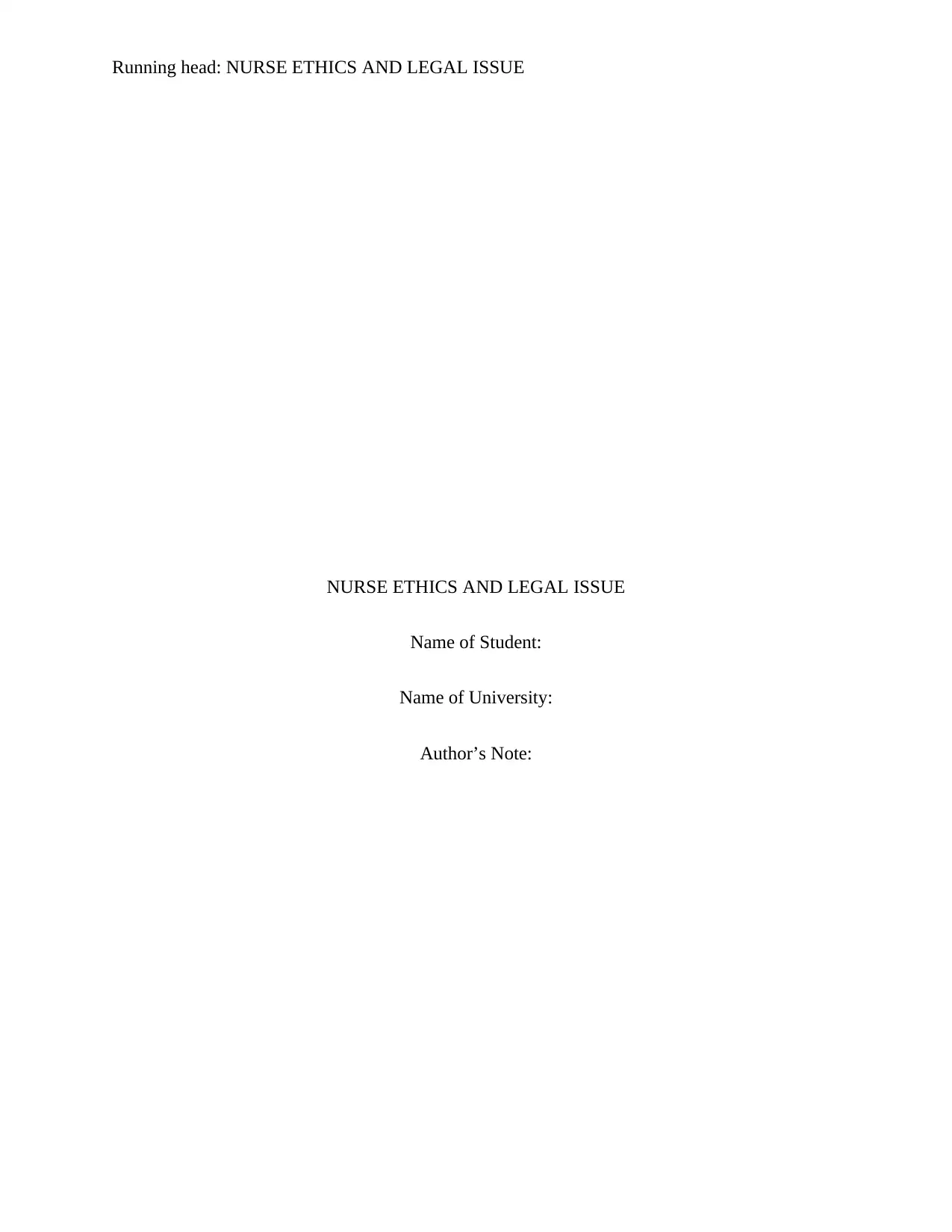
Running head: NURSE ETHICS AND LEGAL ISSUE
NURSE ETHICS AND LEGAL ISSUE
Name of Student:
Name of University:
Author’s Note:
NURSE ETHICS AND LEGAL ISSUE
Name of Student:
Name of University:
Author’s Note:
Paraphrase This Document
Need a fresh take? Get an instant paraphrase of this document with our AI Paraphraser
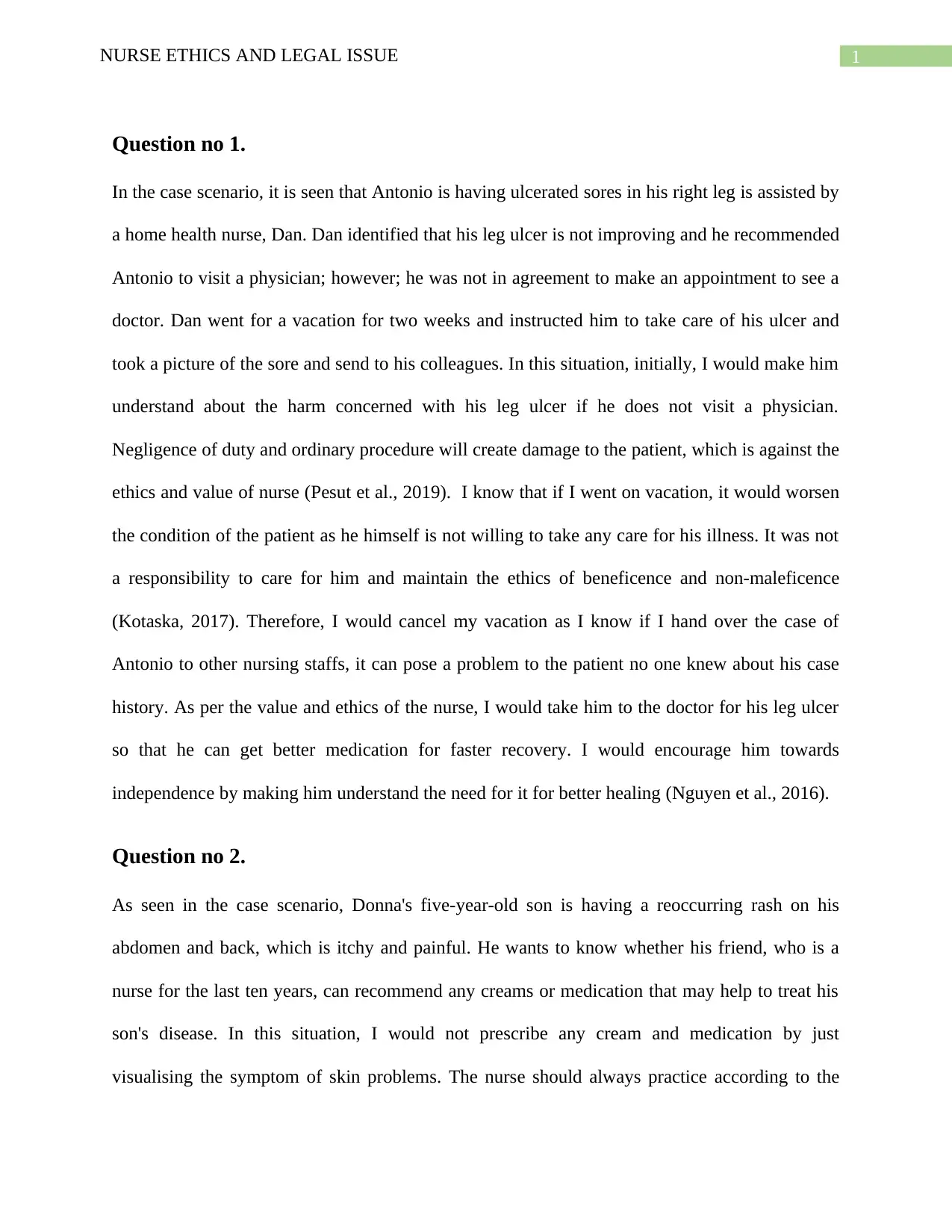
1NURSE ETHICS AND LEGAL ISSUE
Question no 1.
In the case scenario, it is seen that Antonio is having ulcerated sores in his right leg is assisted by
a home health nurse, Dan. Dan identified that his leg ulcer is not improving and he recommended
Antonio to visit a physician; however; he was not in agreement to make an appointment to see a
doctor. Dan went for a vacation for two weeks and instructed him to take care of his ulcer and
took a picture of the sore and send to his colleagues. In this situation, initially, I would make him
understand about the harm concerned with his leg ulcer if he does not visit a physician.
Negligence of duty and ordinary procedure will create damage to the patient, which is against the
ethics and value of nurse (Pesut et al., 2019). I know that if I went on vacation, it would worsen
the condition of the patient as he himself is not willing to take any care for his illness. It was not
a responsibility to care for him and maintain the ethics of beneficence and non-maleficence
(Kotaska, 2017). Therefore, I would cancel my vacation as I know if I hand over the case of
Antonio to other nursing staffs, it can pose a problem to the patient no one knew about his case
history. As per the value and ethics of the nurse, I would take him to the doctor for his leg ulcer
so that he can get better medication for faster recovery. I would encourage him towards
independence by making him understand the need for it for better healing (Nguyen et al., 2016).
Question no 2.
As seen in the case scenario, Donna's five-year-old son is having a reoccurring rash on his
abdomen and back, which is itchy and painful. He wants to know whether his friend, who is a
nurse for the last ten years, can recommend any creams or medication that may help to treat his
son's disease. In this situation, I would not prescribe any cream and medication by just
visualising the symptom of skin problems. The nurse should always practice according to the
Question no 1.
In the case scenario, it is seen that Antonio is having ulcerated sores in his right leg is assisted by
a home health nurse, Dan. Dan identified that his leg ulcer is not improving and he recommended
Antonio to visit a physician; however; he was not in agreement to make an appointment to see a
doctor. Dan went for a vacation for two weeks and instructed him to take care of his ulcer and
took a picture of the sore and send to his colleagues. In this situation, initially, I would make him
understand about the harm concerned with his leg ulcer if he does not visit a physician.
Negligence of duty and ordinary procedure will create damage to the patient, which is against the
ethics and value of nurse (Pesut et al., 2019). I know that if I went on vacation, it would worsen
the condition of the patient as he himself is not willing to take any care for his illness. It was not
a responsibility to care for him and maintain the ethics of beneficence and non-maleficence
(Kotaska, 2017). Therefore, I would cancel my vacation as I know if I hand over the case of
Antonio to other nursing staffs, it can pose a problem to the patient no one knew about his case
history. As per the value and ethics of the nurse, I would take him to the doctor for his leg ulcer
so that he can get better medication for faster recovery. I would encourage him towards
independence by making him understand the need for it for better healing (Nguyen et al., 2016).
Question no 2.
As seen in the case scenario, Donna's five-year-old son is having a reoccurring rash on his
abdomen and back, which is itchy and painful. He wants to know whether his friend, who is a
nurse for the last ten years, can recommend any creams or medication that may help to treat his
son's disease. In this situation, I would not prescribe any cream and medication by just
visualising the symptom of skin problems. The nurse should always practice according to the
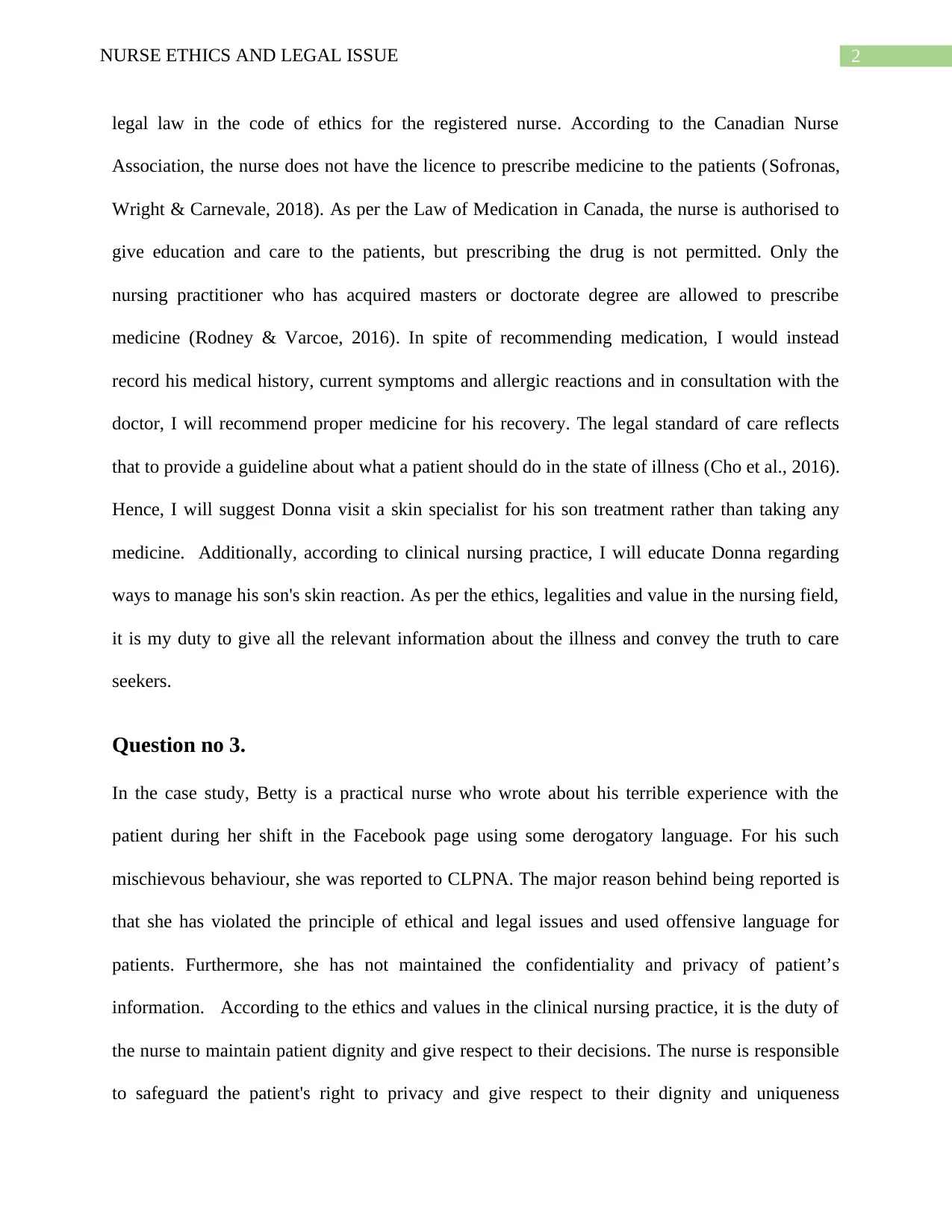
2NURSE ETHICS AND LEGAL ISSUE
legal law in the code of ethics for the registered nurse. According to the Canadian Nurse
Association, the nurse does not have the licence to prescribe medicine to the patients (Sofronas,
Wright & Carnevale, 2018). As per the Law of Medication in Canada, the nurse is authorised to
give education and care to the patients, but prescribing the drug is not permitted. Only the
nursing practitioner who has acquired masters or doctorate degree are allowed to prescribe
medicine (Rodney & Varcoe, 2016). In spite of recommending medication, I would instead
record his medical history, current symptoms and allergic reactions and in consultation with the
doctor, I will recommend proper medicine for his recovery. The legal standard of care reflects
that to provide a guideline about what a patient should do in the state of illness (Cho et al., 2016).
Hence, I will suggest Donna visit a skin specialist for his son treatment rather than taking any
medicine. Additionally, according to clinical nursing practice, I will educate Donna regarding
ways to manage his son's skin reaction. As per the ethics, legalities and value in the nursing field,
it is my duty to give all the relevant information about the illness and convey the truth to care
seekers.
Question no 3.
In the case study, Betty is a practical nurse who wrote about his terrible experience with the
patient during her shift in the Facebook page using some derogatory language. For his such
mischievous behaviour, she was reported to CLPNA. The major reason behind being reported is
that she has violated the principle of ethical and legal issues and used offensive language for
patients. Furthermore, she has not maintained the confidentiality and privacy of patient’s
information. According to the ethics and values in the clinical nursing practice, it is the duty of
the nurse to maintain patient dignity and give respect to their decisions. The nurse is responsible
to safeguard the patient's right to privacy and give respect to their dignity and uniqueness
legal law in the code of ethics for the registered nurse. According to the Canadian Nurse
Association, the nurse does not have the licence to prescribe medicine to the patients (Sofronas,
Wright & Carnevale, 2018). As per the Law of Medication in Canada, the nurse is authorised to
give education and care to the patients, but prescribing the drug is not permitted. Only the
nursing practitioner who has acquired masters or doctorate degree are allowed to prescribe
medicine (Rodney & Varcoe, 2016). In spite of recommending medication, I would instead
record his medical history, current symptoms and allergic reactions and in consultation with the
doctor, I will recommend proper medicine for his recovery. The legal standard of care reflects
that to provide a guideline about what a patient should do in the state of illness (Cho et al., 2016).
Hence, I will suggest Donna visit a skin specialist for his son treatment rather than taking any
medicine. Additionally, according to clinical nursing practice, I will educate Donna regarding
ways to manage his son's skin reaction. As per the ethics, legalities and value in the nursing field,
it is my duty to give all the relevant information about the illness and convey the truth to care
seekers.
Question no 3.
In the case study, Betty is a practical nurse who wrote about his terrible experience with the
patient during her shift in the Facebook page using some derogatory language. For his such
mischievous behaviour, she was reported to CLPNA. The major reason behind being reported is
that she has violated the principle of ethical and legal issues and used offensive language for
patients. Furthermore, she has not maintained the confidentiality and privacy of patient’s
information. According to the ethics and values in the clinical nursing practice, it is the duty of
the nurse to maintain patient dignity and give respect to their decisions. The nurse is responsible
to safeguard the patient's right to privacy and give respect to their dignity and uniqueness
⊘ This is a preview!⊘
Do you want full access?
Subscribe today to unlock all pages.

Trusted by 1+ million students worldwide
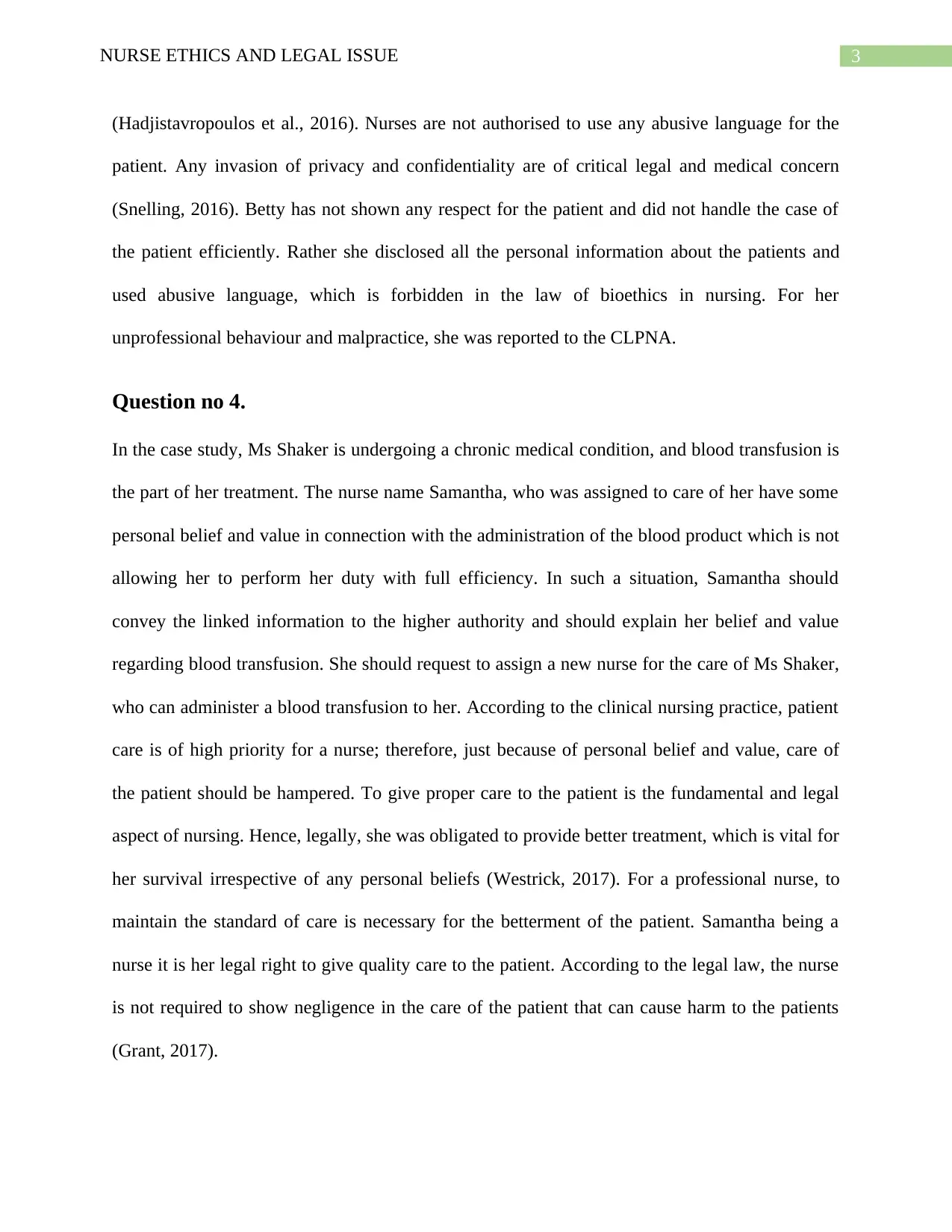
3NURSE ETHICS AND LEGAL ISSUE
(Hadjistavropoulos et al., 2016). Nurses are not authorised to use any abusive language for the
patient. Any invasion of privacy and confidentiality are of critical legal and medical concern
(Snelling, 2016). Betty has not shown any respect for the patient and did not handle the case of
the patient efficiently. Rather she disclosed all the personal information about the patients and
used abusive language, which is forbidden in the law of bioethics in nursing. For her
unprofessional behaviour and malpractice, she was reported to the CLPNA.
Question no 4.
In the case study, Ms Shaker is undergoing a chronic medical condition, and blood transfusion is
the part of her treatment. The nurse name Samantha, who was assigned to care of her have some
personal belief and value in connection with the administration of the blood product which is not
allowing her to perform her duty with full efficiency. In such a situation, Samantha should
convey the linked information to the higher authority and should explain her belief and value
regarding blood transfusion. She should request to assign a new nurse for the care of Ms Shaker,
who can administer a blood transfusion to her. According to the clinical nursing practice, patient
care is of high priority for a nurse; therefore, just because of personal belief and value, care of
the patient should be hampered. To give proper care to the patient is the fundamental and legal
aspect of nursing. Hence, legally, she was obligated to provide better treatment, which is vital for
her survival irrespective of any personal beliefs (Westrick, 2017). For a professional nurse, to
maintain the standard of care is necessary for the betterment of the patient. Samantha being a
nurse it is her legal right to give quality care to the patient. According to the legal law, the nurse
is not required to show negligence in the care of the patient that can cause harm to the patients
(Grant, 2017).
(Hadjistavropoulos et al., 2016). Nurses are not authorised to use any abusive language for the
patient. Any invasion of privacy and confidentiality are of critical legal and medical concern
(Snelling, 2016). Betty has not shown any respect for the patient and did not handle the case of
the patient efficiently. Rather she disclosed all the personal information about the patients and
used abusive language, which is forbidden in the law of bioethics in nursing. For her
unprofessional behaviour and malpractice, she was reported to the CLPNA.
Question no 4.
In the case study, Ms Shaker is undergoing a chronic medical condition, and blood transfusion is
the part of her treatment. The nurse name Samantha, who was assigned to care of her have some
personal belief and value in connection with the administration of the blood product which is not
allowing her to perform her duty with full efficiency. In such a situation, Samantha should
convey the linked information to the higher authority and should explain her belief and value
regarding blood transfusion. She should request to assign a new nurse for the care of Ms Shaker,
who can administer a blood transfusion to her. According to the clinical nursing practice, patient
care is of high priority for a nurse; therefore, just because of personal belief and value, care of
the patient should be hampered. To give proper care to the patient is the fundamental and legal
aspect of nursing. Hence, legally, she was obligated to provide better treatment, which is vital for
her survival irrespective of any personal beliefs (Westrick, 2017). For a professional nurse, to
maintain the standard of care is necessary for the betterment of the patient. Samantha being a
nurse it is her legal right to give quality care to the patient. According to the legal law, the nurse
is not required to show negligence in the care of the patient that can cause harm to the patients
(Grant, 2017).
Paraphrase This Document
Need a fresh take? Get an instant paraphrase of this document with our AI Paraphraser
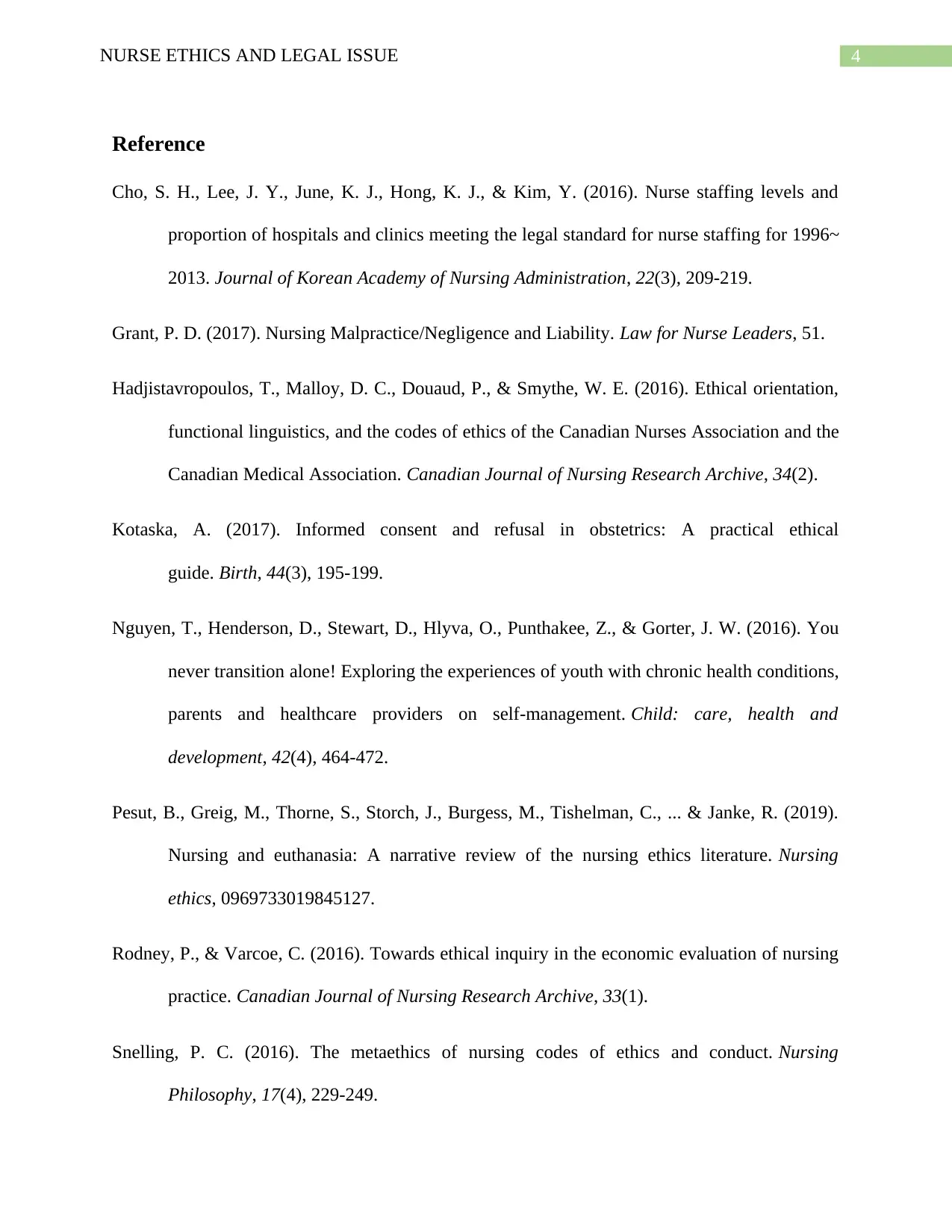
4NURSE ETHICS AND LEGAL ISSUE
Reference
Cho, S. H., Lee, J. Y., June, K. J., Hong, K. J., & Kim, Y. (2016). Nurse staffing levels and
proportion of hospitals and clinics meeting the legal standard for nurse staffing for 1996~
2013. Journal of Korean Academy of Nursing Administration, 22(3), 209-219.
Grant, P. D. (2017). Nursing Malpractice/Negligence and Liability. Law for Nurse Leaders, 51.
Hadjistavropoulos, T., Malloy, D. C., Douaud, P., & Smythe, W. E. (2016). Ethical orientation,
functional linguistics, and the codes of ethics of the Canadian Nurses Association and the
Canadian Medical Association. Canadian Journal of Nursing Research Archive, 34(2).
Kotaska, A. (2017). Informed consent and refusal in obstetrics: A practical ethical
guide. Birth, 44(3), 195-199.
Nguyen, T., Henderson, D., Stewart, D., Hlyva, O., Punthakee, Z., & Gorter, J. W. (2016). You
never transition alone! Exploring the experiences of youth with chronic health conditions,
parents and healthcare providers on self‐management. Child: care, health and
development, 42(4), 464-472.
Pesut, B., Greig, M., Thorne, S., Storch, J., Burgess, M., Tishelman, C., ... & Janke, R. (2019).
Nursing and euthanasia: A narrative review of the nursing ethics literature. Nursing
ethics, 0969733019845127.
Rodney, P., & Varcoe, C. (2016). Towards ethical inquiry in the economic evaluation of nursing
practice. Canadian Journal of Nursing Research Archive, 33(1).
Snelling, P. C. (2016). The metaethics of nursing codes of ethics and conduct. Nursing
Philosophy, 17(4), 229-249.
Reference
Cho, S. H., Lee, J. Y., June, K. J., Hong, K. J., & Kim, Y. (2016). Nurse staffing levels and
proportion of hospitals and clinics meeting the legal standard for nurse staffing for 1996~
2013. Journal of Korean Academy of Nursing Administration, 22(3), 209-219.
Grant, P. D. (2017). Nursing Malpractice/Negligence and Liability. Law for Nurse Leaders, 51.
Hadjistavropoulos, T., Malloy, D. C., Douaud, P., & Smythe, W. E. (2016). Ethical orientation,
functional linguistics, and the codes of ethics of the Canadian Nurses Association and the
Canadian Medical Association. Canadian Journal of Nursing Research Archive, 34(2).
Kotaska, A. (2017). Informed consent and refusal in obstetrics: A practical ethical
guide. Birth, 44(3), 195-199.
Nguyen, T., Henderson, D., Stewart, D., Hlyva, O., Punthakee, Z., & Gorter, J. W. (2016). You
never transition alone! Exploring the experiences of youth with chronic health conditions,
parents and healthcare providers on self‐management. Child: care, health and
development, 42(4), 464-472.
Pesut, B., Greig, M., Thorne, S., Storch, J., Burgess, M., Tishelman, C., ... & Janke, R. (2019).
Nursing and euthanasia: A narrative review of the nursing ethics literature. Nursing
ethics, 0969733019845127.
Rodney, P., & Varcoe, C. (2016). Towards ethical inquiry in the economic evaluation of nursing
practice. Canadian Journal of Nursing Research Archive, 33(1).
Snelling, P. C. (2016). The metaethics of nursing codes of ethics and conduct. Nursing
Philosophy, 17(4), 229-249.
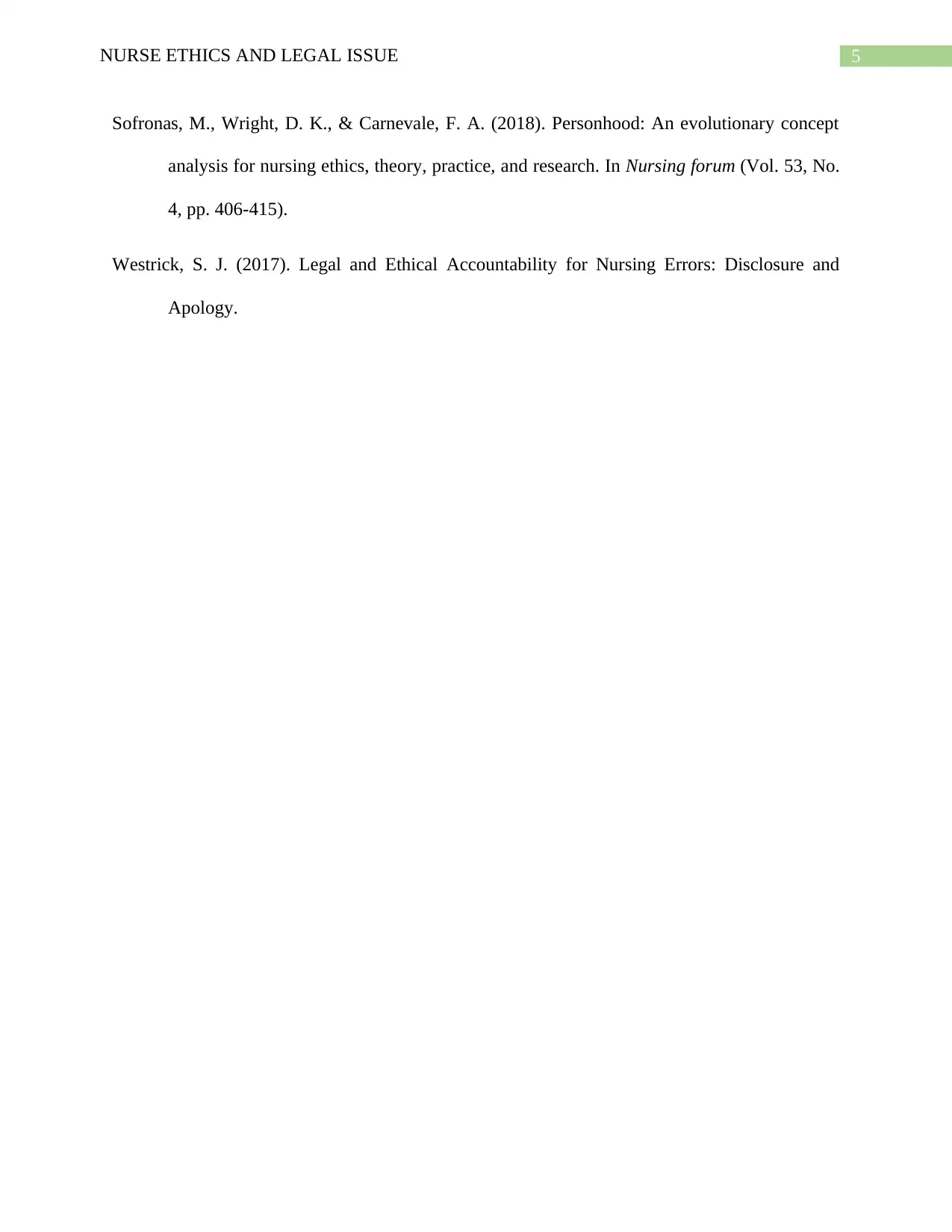
5NURSE ETHICS AND LEGAL ISSUE
Sofronas, M., Wright, D. K., & Carnevale, F. A. (2018). Personhood: An evolutionary concept
analysis for nursing ethics, theory, practice, and research. In Nursing forum (Vol. 53, No.
4, pp. 406-415).
Westrick, S. J. (2017). Legal and Ethical Accountability for Nursing Errors: Disclosure and
Apology.
Sofronas, M., Wright, D. K., & Carnevale, F. A. (2018). Personhood: An evolutionary concept
analysis for nursing ethics, theory, practice, and research. In Nursing forum (Vol. 53, No.
4, pp. 406-415).
Westrick, S. J. (2017). Legal and Ethical Accountability for Nursing Errors: Disclosure and
Apology.
⊘ This is a preview!⊘
Do you want full access?
Subscribe today to unlock all pages.

Trusted by 1+ million students worldwide
1 out of 6
Related Documents
Your All-in-One AI-Powered Toolkit for Academic Success.
+13062052269
info@desklib.com
Available 24*7 on WhatsApp / Email
![[object Object]](/_next/static/media/star-bottom.7253800d.svg)
Unlock your academic potential
Copyright © 2020–2026 A2Z Services. All Rights Reserved. Developed and managed by ZUCOL.





